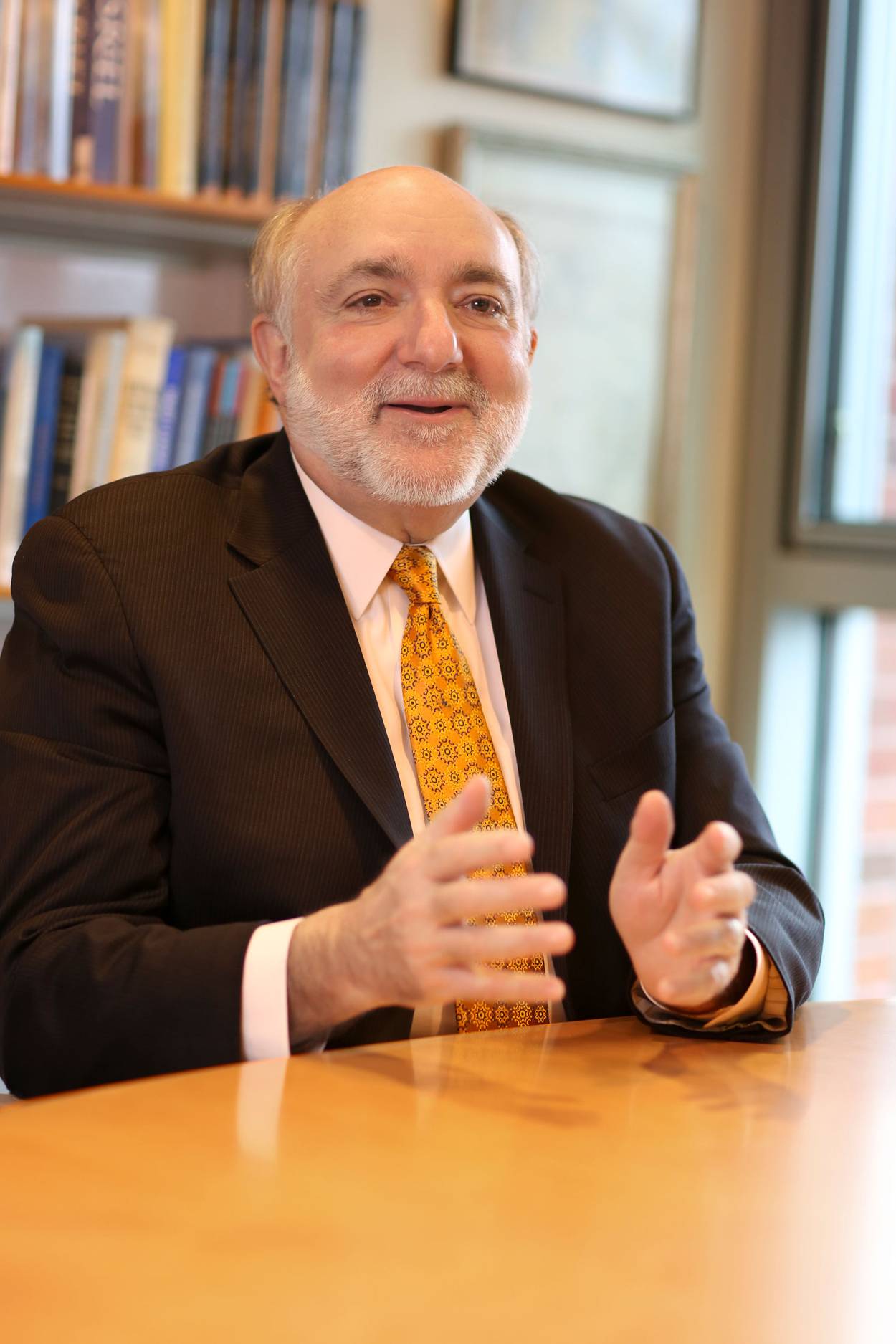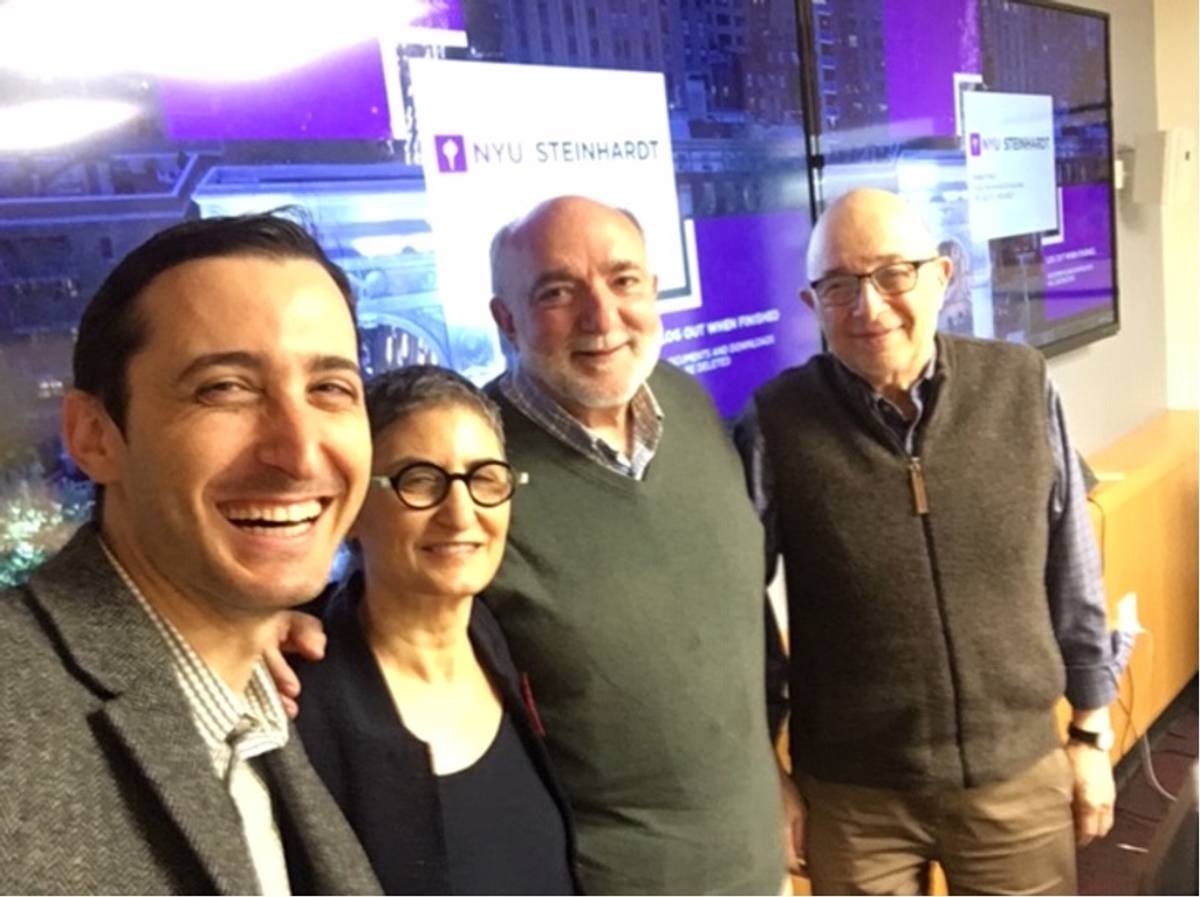A Scholar and a Mensch
As a leader in the Reform movement, David Ellenson earned respect as a scholar across the religious spectrum. And on a personal basis, he was known for his compassion and generosity.


In the liberal Jewish Los Angeles shtetl of Pico-Robertston where I grew up, David Ellenson was something like a beloved godfather to my sister and me. He would pick up his kids, our friends, from car pool and address us all with affectionate greetings that made us laugh. Though he was a Celtics fan, and members of my family were staunch Lakers supporters, our families were fixtures at each other’s sukkahs and simchas. He served as the rabbi at my bar mitzvah and I still recall how empowered he made that already-poised version of myself feel during his words of blessing.
I did not randomly decide to devote my life to education and Jewish studies. It takes a village to raise a child, and David was one of the people who raised me to see the profundity of Jewish tradition, history, and thought. When he first handed me the gift of a crimson paperback—Rabbi Esriel Hildesheimer and the Creation of a Modern Jewish Orthodoxy, the scholarly work that emerged out of his dissertation—I flipped through it. Then, I returned to my math homework. The book sat on my parents’ bookcase for years. As I matured and struggled with the place of Judaism in my life, I reflected on David’s inspiration and encouragement. By opting to attend graduate school, I would eventually learn from him about the mechanisms by which Jewish law adapts and evolves in modernity. As one of my dissertation advisers, David taught me that research and teaching can center human beings and that, because words are powerful—swords or plowshares—I can choose to use language to build up other people and the world.
I feel privileged to have been his student. Although I learned so much from him, I feel even more fortunate to have had such a mensch in my life. In traditional Jewish language, it was a zchut (merit or honor) merely to have been his talmid (disciple).
Rabbi Dr. David Ellenson set a powerful example. In the wake of his untimely Dec. 7 passing, it has become clear that he influenced many across the Jewish world. Global tribute literature has burgeoned in his memory in the last weeks, taking a variety of forms: reportage, obituaries, eulogies, personal anecdotes, accounts of his last hours, and focused explorations of specific dimensions of his legacy. Responses have inundated legacy media, social media, and organizational websites. Although I am not surprised by how many were touched by him, I am astounded at how he was able to make me feel as if I uniquely mattered to him, as I join the chorus of so many who experienced his love.
In polarizing times, it is rare for a rabbi or scholar to gain appeal in divergent sectors of the Jewish community. David Hartman and Jonathan Sacks, both associated with Orthodoxy, are among the last rabbis who were compelling within and far beyond any particular denomination. The outpouring of Ellenson tributes from Reform, Conservative, Orthodox, secular, spiritual, American, Israeli, young, and old voices (among others) is astounding. David Myers contends that Ellenson may have been “the most important Jewish thinker in the United States since Abraham Joshua Heschel,” rendering him a “genuine moreh nevukhim, a teacher or guide to the perplexed [and] a moreh nevukhei hazman, a teacher to the perplexity of a time, who taught us to grapple with and embrace the complexity.”
How did an Orthodox-born child raised in sleepy Newport News, Virginia, ultimately become beloved in varied quarters of Jewish life? How did a scholar of legal responsa literature captivate the interest of many beyond the academy? How did a Reform rabbi and stalwart cultivate respect and even admiration by many Orthodox people?
First, Ellenson, the former chancellor of Hebrew Union College-Jewish Institute of Religion, was experienced as a mensch, a person who lived and modeled a life of Torah and basic goodness. He was seen as a human being of compassion and generosity. He cared about and listened to others. David Wolpe underscores gratitude for Ellenson’s words of encouragement after composing his first graduate school publication. Yehuda Kurtzer considers how Ellenson’s practice of kindness was authentic and unwavering, even with the substantial challenges of life lived in the public eye. Multiple exponents render Ellenson a lamedvavnik or a gadol hador, among the truly outstanding people of this era. Shira Koch-Epstein mourns the loss of “my rabbi” and advocates learning and growing “David’s Torah.” Still others speak of him as a rabbi’s rabbi or as a rebbe. Josh Weinberg speaks to “his soft-spoken, approachable nature, and kindheartedness. He always made time, remembered every detail of your life, and asked thoughtful questions.” Ellenson was an emotional being, characterized by deep feelings and the ability to clearly express them. Though he was always in control, he often teared up and cried publicly. Connected to and proud of students who were becoming rabbis and scholars in their own right, he profoundly cared about them, the State of Israel and the Jewish world, the struggle for justice and human dignity, and his immediate family and friends. Ellenson’s love and compassion—made possible by what Michael Marmur calls his “heart of many rooms”—are by far the most important facets of the recent tributes and assessments of his legacy. Ellenson practiced what he preached, lectured on, and taught in ways that meant so much to those he, apparently, touched.

Courtesy the author
Second, Ellenson was a learned scholar, an accessible teacher, and a proud Jew. He shared his substantial knowledge with humility and self-awareness, such that Zev Eleff speaks of his slight Southern drawl that “rendered his brilliant mind understated and accessible to just about anyone.” In words of Robert Levine from 2014, cited in a recent piece by Andrew Silow-Carroll, “his ability and need to meld his intellectual and personal talents make him among the most impressive and memorable leaders our Movement has ever produced.” He perennially wove together his scholarly insights with facets of his personal journey to make his contentions understandable and relatable to audiences. He skillfully narrated the broader contexts of his life—and, in a sense, all of our lives as fellow travelers through these times—in order to impart scholarly knowledge and teach Torah as refracted through his lens. As Ellenson wrote of his early years back in 2004, “My own Jewish journey cannot be understood apart from the region and time in which I was raised.” In the preface to After Emancipation, he reflected on how, notwithstanding his love of Virginia, it was never home: “For me, it is … a place of intimacy. More profoundly, it is a place of alienation. Part of me felt I never really belonged. It is no wonder, then, in light of all these mixed emotions, that my Jewish journey has taken the direction it has.” He operationalized his personal experience and scholarly toolkit to point to instances of the interplay between modernity and tradition. Jonathan Sarna speaks of his sociological outlook on the Jewish past and present and the “development of modern Jewish religious denominationalism,” illuminating the varied challenges modernity posed—and poses—to Jewish life. As but one example of how he conveyed sociological insights in an accessible manner, he shared in 2008, “In the United States today far more Jews would be able to identify Michael Jordan than the Tana’im who were the authors of the Mishnah,” before reflecting on contours of the water in which we as contemporary Jews swim (beyond immediate questions about Jewish cultural literacy): “When [Jews] approach the Jewish tradition, they will do so with ideas taken from a larger world and will judge the tradition accordingly.”
Third, David integrated and demonstrated academic erudition, tactful leadership, and interpersonal care, embodying a vision of both Reform Judaism and Jewish pluralism. Perhaps the only scholar to have earned honorary degrees from HUC-JIR, JTS, and Yeshiva University, Ellenson received ordination at and subsequently shaped HUC-JIR, an institution to which he devoted decades of tireless work. He saw Reform Judaism as a container that helpfully enabled contemporary Jews to learn, worship, connect, explore, experiment, and more. Nonetheless, he sustained a lifelong commitment to Am Yisrael—the people Israel— such that Menachem Butler calls him a “denominational crossover.” The night before he passed away, Ellenson honored an Orthodox rabbi and scholar-friend, Jacob Schachter, with his presence at a special Upper West Side event. Such behavior characterized a person who prioritized relationships and the potential of common cause toward shared well-being. His rigorous scholarship, such as Between Tradition and Culture: The Dialectics of Jewish Religion as well as Identity in the Modern World After Emancipation: Jewish Religious Responses to Modernity won him admirers, and he was prolific in his research. Even as he worked across lines of difference, Ellenson was committed to a vision of justice that reflected social shifts in society at large. He affirmed and fought for civil rights as well as the recognition of the dignity of women and LGBTQ people. He was committed to a vision of Israel as a Jewish and democratic state, offering critiques of the views of those to both his left and right.
His Jewish, ethical, and practical commitments sometimes differed from colleagues and community members. Still, as a mensch, he evaluated the insights of others “L’kaf Zchut” (Pirkei Avot 1:6), with the scale weighted in their favor. Notwithstanding differences in opinion, many among his ideological opponents were likewise willing to appreciate where Ellenson was coming from. Even as I say this, I do not mean to underestimate significant differences in opinion Ellenson sustained with counterparts over the years, such as concerning the place of the Cincinnati campus for the global mission of HUC-JIR, the place of the State of Israel for contemporary Jews, etc.
In any event, may we continue to learn from David Ellenson—and the many students and counterparts whose lives he touched—how to live with menschlichkeit and yiddishkeit, how to be lifelong learners of Torah, how to be compelling teachers, how to be rigorous and open scholars, and how to actually listen to and care about other people.
Even—or rather, precisely—as things change within the Jewish world and beyond, the aforementioned traits will be essential for the survival and thriving of Jews and humanity in the weeks, months, and years ahead.
Joshua Krug is the Sommerfreund Visiting Professor of Jewish Studies at the Hochschule für Jüdische Studien.